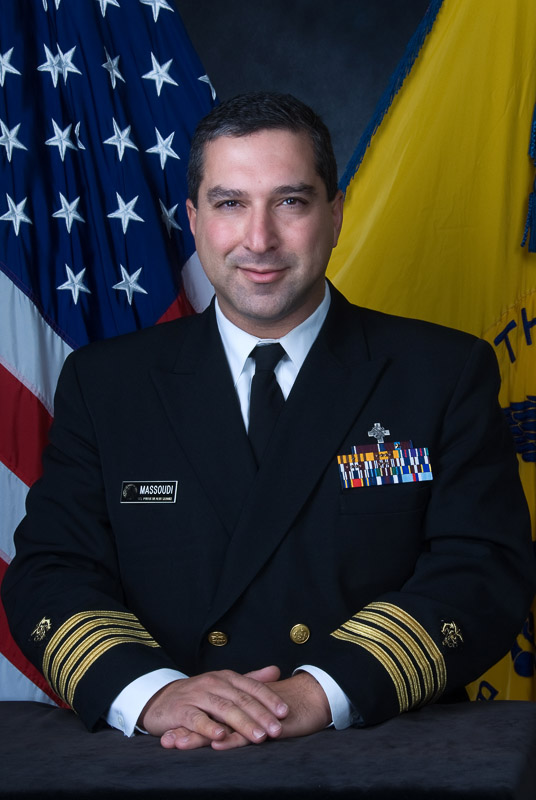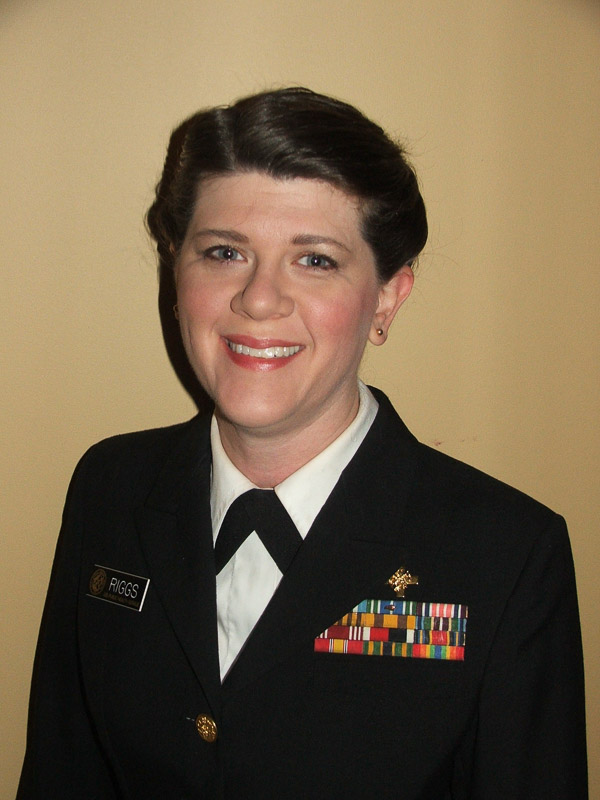2011 Derek Dunn Memorial Senior Scientist Officer of the Year
CAPT Mehran S. Massoudi
 CAPT Mehran S. Massoudi is the Associate Director for Science in the Scientific Education and Professional Development Program Office (SEPDPO), Office of Surveillance, Epidemiology, and Laboratory Services. He oversees all scientific and clearance matters in SEPDPO. Formerly, he led the CDC–Tuskegee Public Health Ethics Fellowship, a collaboration between SEPDPO and CDC’s Public Health Ethics Office. In addition, CAPT Massoudi oversees SEPDPO’s research involving human subjects and the information technology unit.
CAPT Mehran S. Massoudi is the Associate Director for Science in the Scientific Education and Professional Development Program Office (SEPDPO), Office of Surveillance, Epidemiology, and Laboratory Services. He oversees all scientific and clearance matters in SEPDPO. Formerly, he led the CDC–Tuskegee Public Health Ethics Fellowship, a collaboration between SEPDPO and CDC’s Public Health Ethics Office. In addition, CAPT Massoudi oversees SEPDPO’s research involving human subjects and the information technology unit.
CAPT Massoudi began his professional career as a CDC Epidemic Intelligence Service (EIS) Officer in 1994, assigned to the National Institute for Occupational Safety and Health in Cincinnati, Ohio. After completing his 2-year EIS training, he joined CDC’s National Immunization Program (NIP) in Atlanta in 1996. In 2001–2002, CAPT Massoudi, who was by then the science advisor to the Smallpox Team at NIP, authored a key paper about the effectiveness of smallpox postexposure prophylaxis. During this period of heightened awareness of potential terrorist actions, CAPT Massoudi’s paper was instrumental in CDC’s smallpox preparedness activities and planning.
Serving as the SARS Surveillance Team Lead in CDC’s National Center for Infectious Diseases, CAPT Massoudi used his expertise in global health, epidemiology, and surveillance. He was asked to serve for 2 years in Afghanistan (2005–2007), where he oversaw the development of the Afghan Public Health Institute (APHI), which operates under the Afghanistan Ministry of Public Health. His duties there included training and mentoring the APHI staff, as well as assisting with the ministry’s response to the avian influenza outbreaks of 2005–2006. After returning from Afghanistan in 2007, he joined the Office of Workforce and Career Development as the Associate Director for Science in the Career Development Division.
Beyond his regularly assigned duties at CDC, CAPT Massoudi has completed four international deployments to Yemen, Pakistan, Afghanistan, and Egypt for CDC and the World Health Organization as part of the Polio Eradication Initiative. CAPT Massoudi is also an adjunct assistant professor of epidemiology at the University of Pittsburgh, Graduate School of Public Health (GSPH). CAPT Massoudi holds a doctorate in epidemiology and a master of public health degree from the University of Pittsburgh, GSPH.
2011 Junior Scientist Officer of the Year
LCDR Matthew Murphy
 LCDR Matthew Murphy is a senior research scientist/epidemiologist at the National Center for Environmental Health (NCEH) in Atlanta, GA. He completed his Masters in medical entomology studying malaria transmission in East Africa before continuing his vector-borne disease work at the CDC. Dr. Murphy later earned his PhD in Environmental and Occupational Health and Industrial Hygiene at the University of Iowa investigating pesticide-related exposure and health risks in West African workers and communities. He rejoined the CDC as part of the Epidemic Intelligence Service program where he investigates environmental disease outbreaks at the request of state, tribal, and international governments and conducts research to evaluate emerging and ongoing environmental health threats. Some of his field investigations and emergency responses include leading an investigating of drinking water use and contamination issues on the Navajo Nation, evaluating an outbreak of unknown liver disease in Ethiopia, responding to flood events in various states, and investigating formaldehyde levels in FEMA supplied trailers following Hurricane Katrina which then led to an OFRD formaldehyde community education deployment in Louisiana and Mississippi. LCDR Murphy is the heat subject matter expert for NCEH and responds to media interview and information requests to educate the public on preventing heat-related illness.
LCDR Matthew Murphy is a senior research scientist/epidemiologist at the National Center for Environmental Health (NCEH) in Atlanta, GA. He completed his Masters in medical entomology studying malaria transmission in East Africa before continuing his vector-borne disease work at the CDC. Dr. Murphy later earned his PhD in Environmental and Occupational Health and Industrial Hygiene at the University of Iowa investigating pesticide-related exposure and health risks in West African workers and communities. He rejoined the CDC as part of the Epidemic Intelligence Service program where he investigates environmental disease outbreaks at the request of state, tribal, and international governments and conducts research to evaluate emerging and ongoing environmental health threats. Some of his field investigations and emergency responses include leading an investigating of drinking water use and contamination issues on the Navajo Nation, evaluating an outbreak of unknown liver disease in Ethiopia, responding to flood events in various states, and investigating formaldehyde levels in FEMA supplied trailers following Hurricane Katrina which then led to an OFRD formaldehyde community education deployment in Louisiana and Mississippi. LCDR Murphy is the heat subject matter expert for NCEH and responds to media interview and information requests to educate the public on preventing heat-related illness.
As a voting member of SciPAC, LCDR Murphy chaired the 2010-11 Category Day Subcommittee, after serving as co-chair the previous year, to organize the category day speakers and agenda. As a member of Atlanta COA (ACOA), he volunteers and participates in ACOA functions. He is an active member of APHT Team #1 and was responsible for presenting APHT community assessment for public health response (CASPER) results to county and state officials during the Texas July, 2010 OFRD field training. In addition, he has trained officers about CASPER response and methodology at the 2009 USPHS Symposium and the Ft. AP Hill trainings.
2011 Scientist Responder of the Year
CDR Margo Riggs
 Dr. Margo Riggs is a Commander in the US Public Health Service and a Career Epidemiology Field Officer in the Office for Public Health Preparedness and Response at CDC. CDR Riggs is assigned to the Kentucky Department for Public Health, Division of Epidemiology in Frankfort, KY and in that role, she provides public health leadership and expertise in epidemiology and environmental public health; assists in building capacity in surveillance, disaster response, outbreak investigations, and public health interventions. She leads workforce development activities related to epidemiology, environmental health, and public health preparedness; and provides expertise for the design, implementation, analysis and publication of epidemiological investigations. She began her career at CDC as an Epidemic Intelligence Service Officer with the National Institute for Occupational Safety and Health (NIOSH) where she led an exposure assessment of flood-damaged homes in New Orleans following Hurricane Katrina and co-led investigations regarding health effects of exposure to water-damaged homes and respirator donning in post-hurricane New Orleans.
Dr. Margo Riggs is a Commander in the US Public Health Service and a Career Epidemiology Field Officer in the Office for Public Health Preparedness and Response at CDC. CDR Riggs is assigned to the Kentucky Department for Public Health, Division of Epidemiology in Frankfort, KY and in that role, she provides public health leadership and expertise in epidemiology and environmental public health; assists in building capacity in surveillance, disaster response, outbreak investigations, and public health interventions. She leads workforce development activities related to epidemiology, environmental health, and public health preparedness; and provides expertise for the design, implementation, analysis and publication of epidemiological investigations. She began her career at CDC as an Epidemic Intelligence Service Officer with the National Institute for Occupational Safety and Health (NIOSH) where she led an exposure assessment of flood-damaged homes in New Orleans following Hurricane Katrina and co-led investigations regarding health effects of exposure to water-damaged homes and respirator donning in post-hurricane New Orleans.
CDR Riggs serves on committees and workgroups for the USPHS Scientist Professional Advisory Committee, the Cincinnati Commissioned Officers Association, and CDC Public Health Emergency Preparedness and CDC Disaster Surveillance; she participates in editorial review board and grant review panels; and has taught epidemiology public health courses in the US and Afghanistan. CDR Riggs serves as the Deputy Director of the Preventive Medicine Branch within RDF-3 and has deployed as an Environmental Health Epidemiologist to Hurricanes Katrina, Rita, and Gustav; flood responses in Kentucky, ice storms in Kentucky, and the earthquake response in Haiti. CDR Riggs utilizes her scientific background in all her preparedness and response activities, resulting in frequent requests for her leadership and technical expertise at the local, state, national and international levels. She has served as a liaison among the local health departments, state health departments, FEMA, USPHS, and HHS and is recognized for a unique ability to pragmatically apply science to field situations and translate scientific rationale and findings into language that is easily understood by diverse audiences.
Education: BS (Animal Science/Poultry Science), MS (Reproductive Endocrinology), MPH (Epidemiology), and Ph.D (Immunology/Veterinary Medical Sciences) University of Florida; Postdoctoral training (Maternal and Child Health Epidemiology) National Institutes for Health/National Institute for Child Health and Human Development.